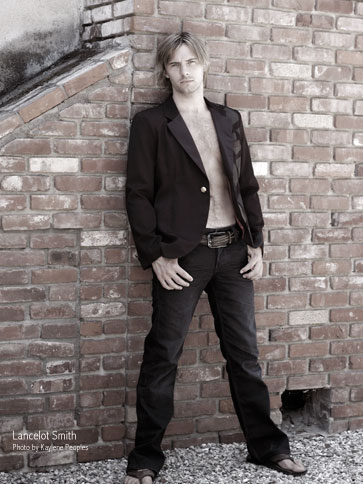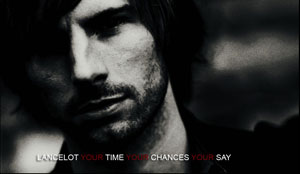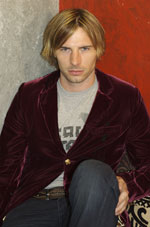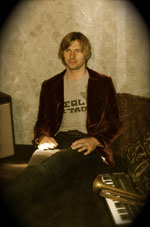 With the dollar being so weak against the euro, singer/songwriter Lance Smith (Lancelot) came to Los Angeles, CA, to work with rock producer Rich Mouser, who lately had been cultivating and producing Irish talent (Paul Toal and Jaded Sun). Lancelot heard about his work and made the decision to collaborate here in L.A. Lancelot had been playing the guitar ever since he was a kid. His uncle lent him an amplifier, and Lancelot got a guitar at age 11. Even though he played sports and had other hobbies, they weren’t the things he was passionate about. Playing guitar and doing music won out as his number one love. He played with a band for a few years but then decided to record his first album as a solo artist.
With the dollar being so weak against the euro, singer/songwriter Lance Smith (Lancelot) came to Los Angeles, CA, to work with rock producer Rich Mouser, who lately had been cultivating and producing Irish talent (Paul Toal and Jaded Sun). Lancelot heard about his work and made the decision to collaborate here in L.A. Lancelot had been playing the guitar ever since he was a kid. His uncle lent him an amplifier, and Lancelot got a guitar at age 11. Even though he played sports and had other hobbies, they weren’t the things he was passionate about. Playing guitar and doing music won out as his number one love. He played with a band for a few years but then decided to record his first album as a solo artist.
I know that you had a little bit of success with a single with the band you were with back home.
Yeah, back in Ireland we released a single. We got lots of playlists and national radio and made some charts. It was decision time, whether I wanted to pursue that with the band and go to the next stage. But I was with a band that was in so many different directions, ideas, styles . . . and my gut told me that this is what I should be doing [being a solo artist]. I wasn’t quite happy with the way it sounded. It wasn’t the band’s fault or even my fault. It was just a difference of opinion, and here I am now.
So tell me about this record, Your Time Your Chances Your Say.
 I broke up with the band and found my direction. I wrote a lot of songs, developed a sound. Got in contact with Rich Mouser and sent over songs to him. I told him I wanted a fun record, upbeat tracks, something free.
I broke up with the band and found my direction. I wrote a lot of songs, developed a sound. Got in contact with Rich Mouser and sent over songs to him. I told him I wanted a fun record, upbeat tracks, something free.
What style would you say it is?
It’s got touches of singer/songwriter. At the same time it has an indie feel. There’s always a chorus and a hook. It’s hard to say, until people start putting you into a bracket: “Oh I didn’t know I was rock opera!” (Laughs) Oh, is that really what we sound like?
What is your role as an artist?
I’m playing drums and guitars on the demo to develop the sound. That’s what I’ll do live. It’s so much freer than being in a band. Building a live show around this album, you can work it around the people you choose. The live show can really replicate what we did on the album.
Dublin seems to be a hotbed for rock and indie music, huh?
Yeah, for the size of the population, there’ve been quite a few bands out of Dublin that have been pretty huge internationally. It’s just one of those cities that has been really creative. There’s always a turnover of really good bands whether they break Ireland or not. Even at home there are always 10 or 15 good artists that are just playing in Ireland. There are gigs all the time, and it’s a relatively small city. I don’t know . . . maybe it’s something in the water.
Tell me about some of the songs in your records. Do you have a favorite song? What are the themes of some of the songs?
There are some love songs without being lovey-dovey, my life, people, places, etc. . . . whatever captures your attention. You can float around, and then all of a sudden a spark hits you and you just go off on it.
Are any of your songs based upon personal experiences?
“Country Life” is a song I wrote at 6:00 in the morning one day in London. It was like a chant. I was shouting it on the phone to some friends. It’s just about getting out of the city. There was one little moment where I had the seed of it, and it just wrote itself like some songs do.
There was one little moment where I had the seed of it, and it just wrote itself like some songs do.
I hear that a lot. When you talk to artists, musicians, painters, actors, writers . . . people who are creative and inventing all the time, a lot of times they say that. Sometimes the spark of inspiration came 5 years ago and it’s been sitting there waiting for it to manifest itself.
That’s the way it happens. Sometimes the inspiration is just sitting there waiting for you to develop it, to grasp it, to run with it. Sometimes you don’t get that straightaway. Sometimes you have this idea sitting in the back of your head and it takes a long time before you realize where they’re supposed to go or where they’re trying to go without trying to force them, just let them happen themselves. Those are always the best songs.
Did you have any challenges in recording this album?
It was a pleasurable experience. There were a few days where I was tearing my hair out to get a song right, worrying about a guitar or vocal line. Considering the amount of hours you spend working on a project in the studio, it’s really been quite easy, straight-forward in a lot of ways. I didn’t expect it to be as smooth (aside from the days when you want to throw yourself in a ditch!).
You used to model. Tell me about that.
I used to do a lot of things to pay the bills, but modeling came up in Dublin. It’s not like New York. It was relaxed. In Dublin it was easy and enjoyable. I did a few good jobs, and it paid the bills. I was with Assets Model Agency in Dublin. Lots of print, TV ads, catwalk shows.
Did your modeling help to define your image for the album?
Going in to making the album, I just wanted to make the album. I consciously didn’t even think about my name, photography, the artwork, the image, or the website. I just wanted to spend all the energy making 10 songs.
 That’s really good. That means the music is the most important thing to you.
That’s really good. That means the music is the most important thing to you.
There’s so much else you can do that takes up so much energy and time that you can get ahead of yourself and start putting energy into areas that don’t matter as much. At the end of the day, the music has to be right. If it’s not right, you can put up all the websites you want. It’s not going to make any difference.
A lot of people would say that what you did was very ambitious. To leave your home and go to another country and work with someone you didn’t know personally, was that a little scary for you? Making the leap of faith to come from Ireland and go to LA.
These days with the internet and communication, it’s so easy to fly material around. I flew material around to people located in London, Australia, US, Dublin. I was trying to match up with a producer who could get what I was trying to do. This was the best option. I heard some previous work. Everything clicked, and it just worked.
How long did the recording take?
30-40 days.
What’s the next step for you?
The music industry is so open these days. It’s a matter of finding what’s right for you, the record, and all the rest that goes with it. It’s exciting.
If you were to sum up the body of work for your album, how would you describe it in one sentence?
Melodic, strong melodies, fun with a bit of oomph to it! At the end of the day, really, I just wanted to make an album that made me happy, and after that everything is a bonus. The first step is done, and I’m happy.
To learn more about Lancelot, visit www.myspace.com/lancelotmusic
Interviewed by Kaylene Peoples